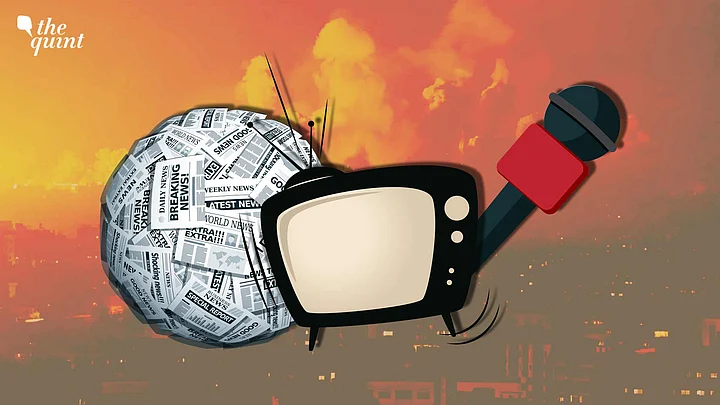In the aftermath of the deadly bombing of the Al Ahli Hospital in Gaza, killing many hundreds including women and children, Israeli Prime Minister Benjamin Netanyahu made a tweet, which was later deleted about this war being a struggle between "the children of light and the children of darkness."
Not long ago, The Guardian ran an article that attributed the Russian brutalities as inherent to their culture, and the Ukrainian official sources also invoked the term orcs, referring to the humanoid creatures serving as the main villain from the Lord of the Rings stories. As pointed out by Emily Couch, the Western commentariat and media were quick to attribute this to Russia’s “Asian-ness” constructing Russia as Oriental.
What these terminological deployments show is that no matter the context, the Western commentariat has not backed down on the deployment of Manichean narratives woven into race.
This is why the tone and content when immigrants in France protested against the police killing of an immigrant youth earlier in 2023 varied from its coverage of the giles jeunes (Yellow Vests) protests.
The idea of the “civilized West” prevails in the popular Western psyche, and rears its ugly head from time to time.
Huntington’s Haunting
Fifteen years after his death, the ghost of Samuel Huntington still haunts Western discourse. In 1996, author Samuel Huntington came out with his controversial and yet widely read book Clash of Civilizations and the Remaking of the World Order.
In that book, he argued that wars and other forms of conflict will happen not at the level of nation-states or ideologies, but in cultures whose loyalties at the highest level would be defined by religion. In his conclusion, Huntington argued that in the American context, American civilisational identity should always be rooted in Europe, and that multiculturalism must be rejected and fought.
The aftermath of the deadly 9/11 attacks on the Twin Towers only strengthened this view, and President George W Bush invoked undertaking a “crusade” against terrorism, which only strengthened fears of a clash of civilizations conflict. His usage of “axis of evil” and his “with us or with the terrorists” speech further cemented this.
The results of these wars were devastating, with a huge number of civilian deaths in Iraq, Afghanistan, and many other regions. Far from ending terrorism, it only strengthened it, enabling the rise of ISIS in the region which had to be destroyed as a territorial force in a bloody, protracted war wherein the ones who fought the hardest against ISIS had been Muslims themselves.
The Taliban only gained legitimacy due to the indiscriminate deaths in Afghanistan and now is on a path to quiet normalisation. In short, this approach failed to achieve what it was purported to achieve, and many of the actual nefarious actors got away.
The Ease of Essentialism
In a world of entwining complications, essentialism is an easy and alluring option to deploy, often with a mass media that is more than willing to participate. Yes, wars of aggression and terrorism are condemnable. But skipping over historical contexts inevitably leads to the audience simply filling the missing gaps with the idea of irreconcilable civilizational differences.
The truth of the matter is that the most bitter bloodshed, whether the Partition mass violence in the wake of the creation of modern-day India and Pakistan, or the violent breakup of Yugoslavia – the people have more cultural and linguistic similarities than differences, even in the ongoing war between Israel and Hamas.
While there is a religious component to it, the root cause is the disastrous colonial policies by the British in Palestine, followed by a continuous blank cheque US backing to Israel, which enabled leaders such as Netanyahu to run aggressive policies such as building settlements in occupied Palestine unchecked
It must be kept in mind that essentialism is not a purely Western practice. It doesn’t end at painting all Russians, Iraqis, Afghans, or Palestinians as barbaric. In Rwanda too, we saw essentialism give way to dehumanisation, resulting in the genocide of the Tutsis.
Risks are closer home too, where news channels like Zee News and Sudarshan News constantly blare hateful rhetoric under the guise of political debates, often deploying tropes against Muslims that are reproductions of the same ideas that Western media uses against non-white people.
These conflicts are not “millennia-old” but the products of intersecting political developments such as disastrous colonial policies, the backing of ethno-nationalist projects in the wake of state fracture, and the unaccountability of major powers in their respective spheres of influence.
As such, rushing to blame Muslims and Jews in other parts of the world risks the creation of cycles of hatred. In an interconnected world where information travels almost instantaneously, the media has a role to not just avoid misinformation but also place importance on the rigour of analysis.
It must be kept in mind that the first man to be killed in a post 9/11 hate crime was a Sikh, Balbir Singh Sodhi. There was another hate crime, this time a six-year-old Palestinian-American boy in Illinois on 16 October 2023.
The media, therefore, has an utmost responsibility to do away with the essentialism of race, religion, and ethnicity when providing coverage of wars and conflicts.
(Shivam Bahuguna is a PhD scholar from South Asian University, New Delhi. He tweets about different topics on @JanusBlinked. This is an opinion piece and the views expressed above are the author’s own. The Quint neither endorses nor is responsible for the same.)
(At The Quint, we question everything. Play an active role in shaping our journalism by becoming a member today.)
